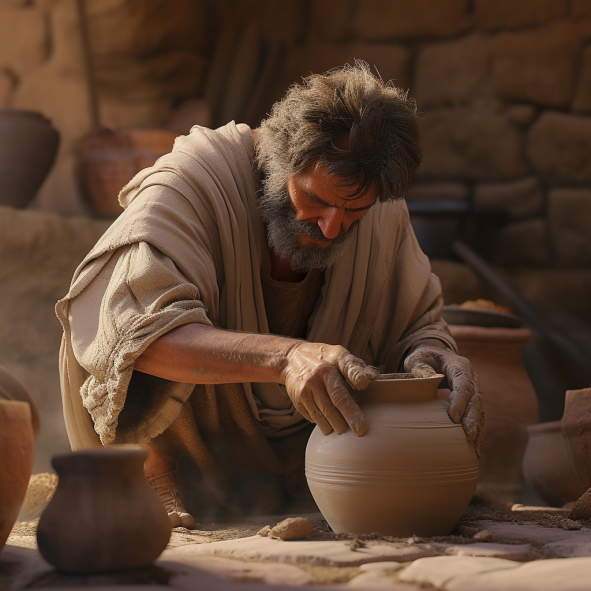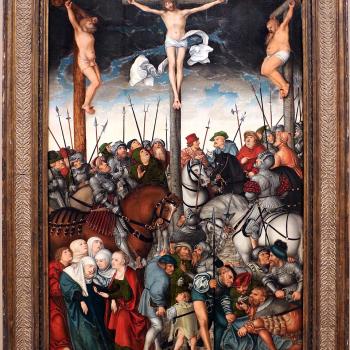The Apocrypha are ancient Jewish texts written in Greek from between the time of the Old and the New Testament. Catholics consider seven of them as canonical–actually, deuterocanonical, meaning “second canon,” reflecting their controversial status as Scripture–while the Orthodox accept those and six more.
Protestants, though, do not accept these late, Hellenistic books as divinely inspired. Luther said of the Apocrypha, “These books are not held equal to the Sacred Scriptures, and yet are useful and good for reading.” So he included them in his translation of the Bible, but he collected them together and placed them all between the Old Testament and the New Testament, thus making clear where they fell historically.
Other early Protestant Bible translations, such as the King James version, followed Luther in this, though eventually the Apocrypha was dropped from most Protestant editions and modern translations. More recently, though, some modern translations, such as the ESV, do have editions that include them, setting them apart as Luther did.
Lutherans have often drawn on these books in treatises, liturgies, sermons (as Walther did), and even the Lutheran confessions. Concordia Publishing House has published a translation of the Apocrypha: The Lutheran Edition with Notes.
At any rate, I quite randomly stumbled upon a passage from The Book of Sirach, also known as Ecclesiasticus, that addresses vocation in a manner that blew me away.
Sirach chapter 38 begins by praising the vocation of physicians and pharmacists (my bolds):
Honor the physician with the honor due him, according to your need of him,
for the Lord created him;
for healing comes from the Most High,
and he will receive a gift from the king.
The skill of the physician lifts up his head,
and in the presence of great men he is admired.
The Lord created medicines from the earth,
and a sensible man will not despise them.
Was not water made sweet with a tree
in order that his power might be known?
And he gave skill to men
that he might be glorified in his marvelous works.
By them he heals and takes away pain;
the pharmacist makes of them a compound.
His works will never be finished;
and from him health is upon the face of the earth.
My son, when you are sick do not be negligent,
but pray to the Lord, and he will heal you.
Give up your faults and direct your hands aright,
and cleanse your heart from all sin.
Offer a sweet-smelling sacrifice, and a memorial portion of fine flour,
and pour oil on your offering, as much as you can afford.
And give the physician his place, for the Lord created him;
let him not leave you, for there is need of him.
There is a time when success lies in the hands of physicians,
for they too will pray to the Lord
that he should grant them success in diagnosis
and in healing, for the sake of preserving life.
He who sins before his Maker,
may he fall into the care of a physician. (Sirach 38:1-15)
Here is Luther’s point that God works by means of human beings in their vocation. God gives healing, but He does so through the medical professions. “By them he [God] heals and takes away pain.”
Then, after a touching passage about mourning for the dead, Sirach turns to the calling of craftsmen and those who work with their hands. He begins by acknowledging that these folks may not have the education or the intellectual wisdom of the scribes. For that you need leisure. And manual laborers do not occupy the heights of the social hierarchy. And yet, their skill is marvelous and they and their labors are the foundation of human society!
. . . .every craftsman and master workman
who labors by night as well as by day;
those who cut the signets of seals,
each is diligent in making a great variety;
he sets his heart on painting a lifelike image,
and he is careful to finish his work.
So too is the smith sitting by the anvil,
intent upon his handiwork in iron;
the breath of the fire melts his flesh,
and he wastes away in the heat of the furnace;
he inclines his ear to the sound of the hammer,
and his eyes are on the pattern of the object.
He sets his heart on finishing his handiwork,
and he is careful to complete its decoration.
So too is the potter sitting at his work
and turning the wheel with his feet;
he is always deeply concerned over his work,
and all his output is by number.
He moulds the clay with his arm
and makes it pliable with his feet;
he sets his heart to finish the glazing,
and he is careful to clean the furnace.
All these rely upon their hands,
and each is skilful in his own work.
Without them a city cannot be established,
and men can neither sojourn nor live there.
Yet they are not sought out for the council of the people,
nor do they attain eminence in the public assembly.
They do not sit in the judge’s seat,
nor do they understand the sentence of judgment;
they cannot expound discipline or judgment,
and they are not found using proverbs.
But they keep stable the fabric of the world,
and their prayer is in the practice of their trade. (Sirach 38: 27-34)
Notice how Sirach enters into the point of view of the craftsman, showing vividly what it feels like to be a blacksmith working at his furnace (“the breath of the fire melts his flesh”) and the scrupulous care that it takes to do the job right (“he is always deeply concerned over his work”).
And appreciate Sirach’s insight about the critical, foundational importance of these lowly workers: “Without them a city cannot be established, and men can neither sojourn nor live there.”
Then comes the climactic summary: “they keep stable the fabric of the world”! Followed by a statement that captures the spiritual significance of all vocations: “their prayer is in the practice of their trade”!
Illustration: Jeremiah 18 , AI image via BiblePics, CC BY-NC 4.0


















